

It’s official! According to science, reading fiction makes you nicer. ‹ Literary Hub. Infographic: School librarian recruitment – valuing reading for… 5 Kinds of Nonfiction: A New Way of Thinking About Informational Books for Children. A new and useful framework for thinking about nonfiction in the classroom.
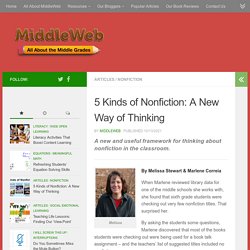
Melissa By Melissa Stewart & Marlene Correia. Green at 15 – what schools can do to support the climate. ‘Never before have the stakes been so high for the role of science education in shaping how people interact with the environment.
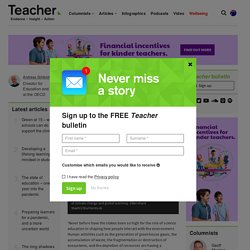
Human activities such as the generation of greenhouse gases, the accumulation of waste, the fragmentation or destruction of ecosystems, and the depletion of resources are having a substantial impact on the global environment.’ These were the opening sentences of a report from one of the first PISA (Programme for International Student Assessment) assessments, carried out back in 2006.
PISA 2006 offered the first international assessment on what students know about the environment. Developmental Bibliotherapy – Using Fiction to Help Teens Navigate Adolescence. Engaging Developing Readers. Reading is a skill that initially appears to be accessible to some, and downright daunting for others.
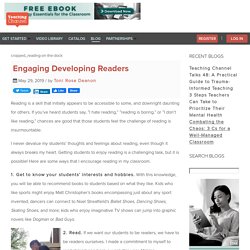
If you’ve heard students say, “I hate reading,” “reading is boring,” or “I don’t like reading,” chances are good that those students feel the challenge of reading is insurmountable. I never devalue my students’ thoughts and feelings about reading, even though it always breaks my heart. Trusted Sources and Voices on the Science of Reading. Experts, Journals, and Studies with Reliable Information on the Science of Reading There’s so much information available on the Science of Reading, and as educators strive to make instructional decisions in an informed way, based on evidence and supported by cognitive science, the amount of information to sift through can be overwhelming.
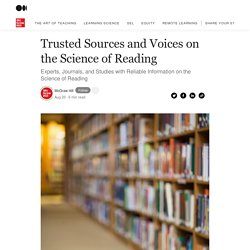
In addition to the sheer amount of information is the quality of the information — not all articles are research, and not all studies are equal in terms of validity or translation to classroom practices. To help educators think about their approach to navigating research in service of literacy instruction, we asked reading experts Jan Hasbrouck and Tim Shanahan for their thoughts on the current landscape of literacy research in reltaion to the Science of Reading. Then, we collected a few reliable sources for you to begin (or continue) your literacy learning journey. Yes, audiobooks count as 'real reading'. Here are 3 top titles to get you started. Audiobook listening has been called a “silent revolution” in the publishing industry over the last decade.
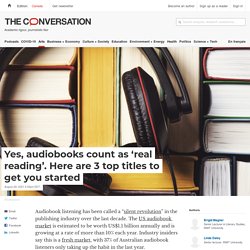
The US audiobook market is estimated to be worth US$1.1 billion annually and is growing at a rate of more than 10% each year. Industry insiders say this is a fresh market, with 37% of Australian audiobook listeners only taking up the habit in the last year. Audiobook downloads (up 15% on the previous year) were part of a pandemic boost for publisher revenues. Step into a School Library and find yourself. School Improvement Episode 33: Reading engagement in rural schools. This podcast from Teacher is supported by the Australian Volunteers Program.
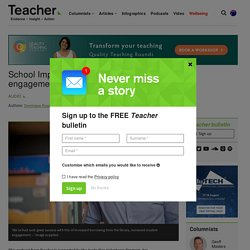
Are you interested in supporting communities overseas? Become a remote volunteer. Visit australianvolunteers.com to learn more. Thanks for downloading this podcast from Teacher magazine. There Is No Such Thing as a Reluctant Reader - John Spencer. Boys prefer non-fiction? Challenging the myth. A new Australian study exploring reading enjoyment, reading frequency and student achievement has challenged the gender stereotype that boys prefer non-fiction, underscoring the importance of all students being given access to a wide range of genres and text types from an early age.
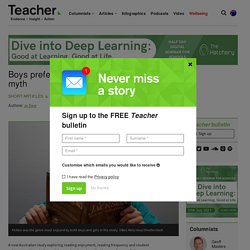
Reading for pleasure has been a recurring topic on Teacher in recent weeks. Research shows it is linked to higher reading outcomes, and has a positive impact on vocabulary, spelling and maths skills. Now, Associate Professor Laura Scholes says these ‘significant’ and ‘unexpected’ new findings ‘challenge the long-standing myth’ that boys prefer to plump for non-fiction. ‘Fiction plays a key role in reading development,’ she says. School-based action research – igniting a love of reading for pleasure. Reading for pleasure has been shown to have a powerful influence on children’s learning; in developing vocabulary, but also spelling and maths skills.
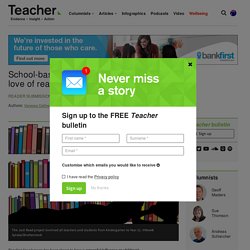
In our latest reader submission about learning during lockdown, Junior School Curriculum Director Vanessa Collins shares details of the ‘Just Read’ action research project to build a culture of reading at Sydney’s Queenwood School for Girls, and ignite in students a love of reading for pleasure. Increasing concern over a lack of student engagement in reading for enjoyment amongst many of our students led to the genesis of a research project entitled ‘Just Read’.
Driven by a deep passion for literacy and a desire to ignite in students a love of reading for pleasure, the project centred on three key questions: Does engagement in daily timetabled sustained silent reading (SSR) improve K–12 students’ attitudes toward reading for pleasure? Continuing through the pandemic. When Kids Say ‘I’m not a reader’: How Librarians Can Disrupt Traumatic Reading Practices - MindShift. Shaming reading choices and judging what students want to read.
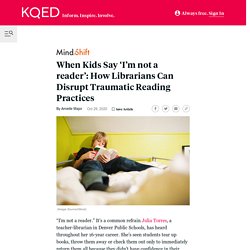
If students are told that what they like to read (comics, manga and fan fiction for example) do not “count,” they can disengage and lose their identities as readers. Book leveling, which is often generated by a computer system that may incorrectly assess complexity of theme and language. “We have to be really cautious of the fact that leveling and scores are generated for teacher use, not so much for students to position themselves,” said Torres. When students feel like they’re not meeting their teachers’ expectations or when they don’t feel like where they should be as a learner, that can be a source of trauma. What can librarians do to interrupt reading trauma? Adults engaging in reading for pleasure. Reading for pleasure is defined as reading that we do of our own free will, anticipating the satisfaction that we will get from the act of reading.
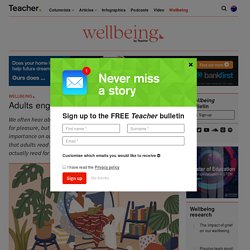
It typically involves materials or texts that reflect our own choice, at a time and place that suits us (Clark & Rumbold, 2006). Children and teenagers are often encouraged to find a love of reading or to find texts that they enjoy consuming. But adults aren’t usually afforded the same level of encouragement. So, is it important that adults engage in reading for enjoyment? A study published in 2017 by the Australia Council for the Arts and Macquarie University found that 51 per cent of the 3000 participants in the sample were considered occasional readers (those who have read between one and 10 books in the last 12 months) and 41 per cent were considered frequent readers (more than 10 books).
Teacher Staffroom Episode 27: Read all about it. Thanks for listening to this episode of Teacher Staffroom, where we catch you up on the latest evidence, insight, and action. I'm Rebecca Vukovic. In today’s episode I’m shining a spotlight on reading, as it’s been a topic covered quite a lot on Teacher recently. From encouraging students to find a love of reading, to ensuring they have access to a wide variety of texts, to the books children borrowed most frequently from libraries in 2020 – there is so much to squeeze into this Teacher Staffroom episode. Diverse schools need diverse collections. Today, Aotearoa New Zealand is one of the most diverse nations on Earth. But how can we ensure our school library collections reflect the diversity of our school communities? Appraising collections for diversity In this blog post, we explore how school library staff can carry out a diversity audit to appraise their collections to ensure all children have access to high-interest, high-quality resources representative of their lives and their communities that also introduce them to different lives and communities.
A 'superdiverse' nation.
Read On Get On launch report 2014. How I made the school library the heart of our school - Books2All. In May 2017, I started my role as reading engagement coordinator in Queensbridge School – a mixed comprehensive in Birmingham – having come from a background in university libraries and education. Despite a life-long love of young adult (YA) fiction, libraries and reading, this was my first experience working in a school library and my first day back at school for a long time. The library was new, having been relocated from another part of the school and opened a year before. So, there was definitely plenty of scope to create an inclusive, supportive, welcoming and creative space – which I love to do. As I built the role, it became apparent that the library was about more than books; it was a hub for some of our most vulnerable pupils and getting to know these young people was key to them making the most of the library resource.
Infographic: Student enjoyment of reading. A place to get away from it all: 5 ways school libraries support student well-being. Students in Australia and around the world have experienced significant challenges this year, including the COVID-19 pandemic and natural disasters. Globally, as many as one in five young people may experience mental-health problems. These can be exacerbated, or even brought on by, stressful life events including economic pressures related to the pandemic. 10 ways to get the most out of silent reading in schools.
Reading aloud can help young children learn about new words and how to sound them. There’s great value too in providing opportunities for children to enjoy regular silent reading, which is sustained reading of materials they select for pleasure. But not all schools consistently offer this opportunity for all of their students. Six things you can do to get boys reading more. How to get teenagers to read. Op-Ed: Do students learn best via printed books or digital texts? ReadPlus - Building a Reading Culture: A Selection of Articles from FYI & Synergy. GER. Does reading fiction make us better people? - BBC Future. The Case for Reading Fiction. How can Booktok on TikTok inform readers' advisory services for young people? Graffiti Books: From Weeded to Wanted (and Written In!) BOOK WEEK 2021 - Home. Ignite a passion for reading: Strategies to promote recreational reading.
What's the Science Behind Reading? World Reading Habits in 2020 [Infographic] - Global English Editing. Stanislaus Dehaene’s Reading in the Brain – Why – and What – Should We Read? Infographic: Maths and science performance and books in the home -… Graffiti Books: From Weeded to Wanted (and Written In!) Book Pairings to Motivate Teenagers.